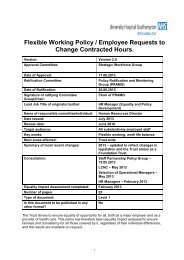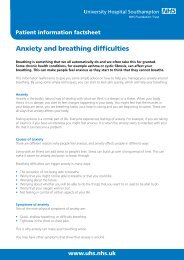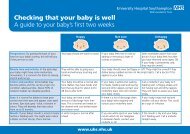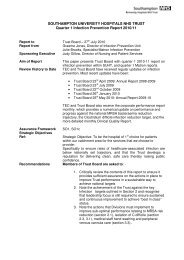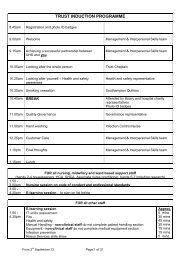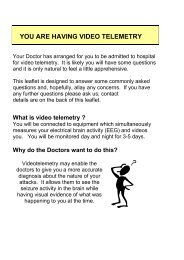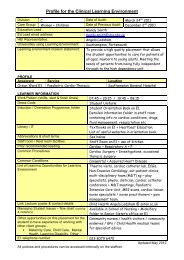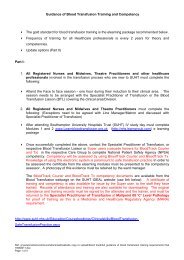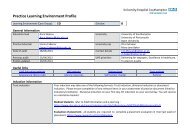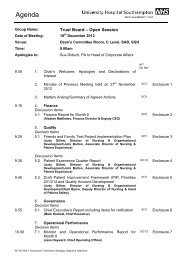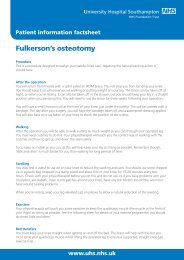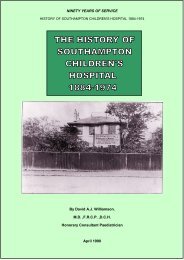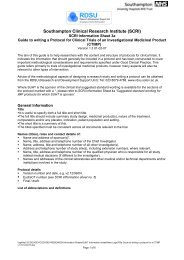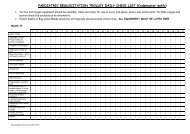Training and development annual report 2011-2012 - University ...
Training and development annual report 2011-2012 - University ...
Training and development annual report 2011-2012 - University ...
You also want an ePaper? Increase the reach of your titles
YUMPU automatically turns print PDFs into web optimized ePapers that Google loves.
ForewordThis has been another excellent year for education <strong>and</strong> training in the Trust. We are increasingthe numbers of staff at every level who are able to take up educational opportunities to broadentheir skills <strong>and</strong> competencies <strong>and</strong> to help them further their career. The Trust’s innovative <strong>and</strong>flexible approaches have continued to ensure that we have highly competent staff consistentlydelivering high quality care.We have continued to further develop our partnerships with other education providers includingSouthampton <strong>University</strong> <strong>and</strong> Southampton Solent <strong>University</strong>, <strong>and</strong> we have managed to bringadditional education funding into the Trust to further benefit our staff, through successful bids.Finally, our leadership <strong>development</strong> opportunities are also exp<strong>and</strong>ing <strong>and</strong> we have increasedthe number of internal courses we run as well as supporting staff to attend regional<strong>development</strong> programmes.All of this activity is continuing towards improving our patients’ care <strong>and</strong> experience <strong>and</strong>retaining <strong>and</strong> attracting new staff.I hope you enjoy reviewing our successes this year.Judy GillowDirector of Nursing / Executive Lead for Education<strong>Training</strong> <strong>and</strong> <strong>development</strong> Annual <strong>report</strong> <strong>2011</strong>- <strong>2012</strong> Page 2
CONTENTS<strong>Training</strong> <strong>and</strong> Development <strong>annual</strong> <strong>report</strong> <strong>2011</strong> - <strong>2012</strong>....................................................... 4<strong>Training</strong> <strong>and</strong> Development delivers QUALITY ................................................................... 6<strong>Training</strong> <strong>and</strong> <strong>development</strong> promotes INNOVATION ........................................................ 10<strong>Training</strong> <strong>and</strong> <strong>development</strong> improves PRODUCTIVITY .................................................... 13<strong>Training</strong> <strong>and</strong> <strong>development</strong> supports PREVENTION ........................................................ 16Report from division A ....................................................................................................... 18Report from division B ....................................................................................................... 20Report from division C ....................................................................................................... 25Report from division D ....................................................................................................... 29<strong>Training</strong> <strong>and</strong> <strong>development</strong> finances <strong>2011</strong> – <strong>2012</strong>............................................................. 31<strong>Training</strong> <strong>and</strong> <strong>development</strong> Annual <strong>report</strong> <strong>2011</strong>- <strong>2012</strong> Page 3
<strong>Training</strong> <strong>and</strong> Development <strong>annual</strong> <strong>report</strong> <strong>2011</strong> - <strong>2012</strong>This year has been another successful year for the Trust <strong>and</strong> education <strong>and</strong> learning. Our successful bidto become a Foundation Trust prompted the department to review our br<strong>and</strong>ing to ensure staff, students<strong>and</strong> external customers recognise the services we provide <strong>and</strong> the opportunities available to them. Wewant to ensure we are a high quality, customer-focused department. Thus, whilst retaining ourmultiprofessional <strong>and</strong> cross-disciplinary ethos (the integrated part of IDEAL), we have changed our name<strong>and</strong> rebr<strong>and</strong>ed with new purple corporate colours to <strong>Training</strong> <strong>and</strong> Development. Our br<strong>and</strong> is very muchin keeping with the new Trust corporate identity <strong>and</strong> we worked closely with the communications team tomake this happen.So although we have a new name we continue to aspire to <strong>and</strong> deliver excellent educational outcomes.The external environment has been very turbulent with ongoing uncertainties raised by the MPET(Multiprofessional education <strong>and</strong> training levy) review, which has the potential to reduce significantly theeducational income to the Trust. This was combined with the White Paper on the future structures ofeducation which proposes the formation of employer led LETBs (Local education <strong>and</strong> training Boards)from April 2013 with the demise of the SHA.The Trust <strong>and</strong> representatives from our department have contributed to the stakeholder events, which areinforming these <strong>development</strong>s, <strong>and</strong> our chief executive is a member of the shadow LETB board. Whilstthe final structures, footprint <strong>and</strong> functions are not yet clear there will be undoubted opportunities in aneducation infrastructure which is employer led, not least in promoting a more streamlined approach toworkforce <strong>development</strong> <strong>and</strong> education as a joined up activity.This year has seen a plethora of awards <strong>and</strong> recognition of the high quality of education <strong>and</strong> training weprovide. The diversity in this <strong>report</strong> reflects the huge spectrum of education <strong>and</strong> learning which takesplace each year. We know our staff appreciate this, by individual feedback <strong>and</strong> continued good results viathe staff survey which put us in the top 20% of Trusts for education <strong>and</strong> learning in several areas. TheTrust, through the Vocational Skills Centre, won the Large Employer of the Year <strong>and</strong> the overall EmployerRecognition Award from Southampton City College. Tracey Graham led a team which produced a patientinformation DVD, filmed <strong>and</strong> edited by learning support, which won a national award, (the ThrombusInnovation award in <strong>2011</strong>) which beat off high profile competitors. In training <strong>and</strong> <strong>development</strong> the teamcelebrated the success of Carrie Hamilton who is the simulated patient lead, winner of the HospitalHeroes <strong>2011</strong> Education <strong>and</strong> <strong>Training</strong> Award which was sponsored by the <strong>University</strong> of Southampton. Thefirst cohort completed a year in the clinical academy, delivering 14 projects across the organisation whilstdeveloping their own leadership talents. This brings to fruition the aspirations of the CEO who conceived<strong>and</strong> then championed the idea some time ago. There are many more successes detailed in the pageswhich follow.We have excellent working relationships with our partner HEI organisations particularly the Universities ofSouthampton, Solent <strong>and</strong> Portsmouth <strong>and</strong> we continue to work constructively with them as we aim to bepart of a developing academic health science network which is co-terminus with the evolving LETB. Wealso have worked constructively with the FE sector <strong>and</strong> other Trusts, a notable success being thecollaborative leadership events around diabetes which should improve the experience <strong>and</strong> outcomes ofpatients as their care pathways are redesigned <strong>and</strong> improved. With the launch of the major trauma centrewe have led the way in trauma education hosting a number of training events for our own staff <strong>and</strong> thetrauma network, with outst<strong>and</strong>ing feedback, which underpins this key <strong>development</strong> for our Trust <strong>and</strong> thewider region.Once again I wish to acknowledge the huge contribution of all the team in <strong>Training</strong> <strong>and</strong> <strong>development</strong> whodo a fantastic job day in <strong>and</strong> out in supporting <strong>and</strong> furthering educational opportunities for all staff acrossthe Trust. Similarly we are a high-performing, educationally-driven organisation where it is difficult to findany corner where education <strong>and</strong> learning is not happening on a daily basis. It is a great place to learn.Jo MountfieldDirector of Education<strong>Training</strong> <strong>and</strong> <strong>development</strong> Annual <strong>report</strong> <strong>2011</strong>- <strong>2012</strong> Page 4
Departures'Chris <strong>and</strong> Liz' (as they were often jointly referred to) retired in June <strong>2011</strong> after running the Wessex NVQCentre at SUHT for over 10 years. They helped to evolve this from being an NVQ Centre to become theVocational Skills Centre with a broader remit for supporting the <strong>development</strong> of staff in B<strong>and</strong>s 1-4. Theyboth had extensive clinical experience, Chris having worked for many years here as a NursingAuxiliary/SHCA (having completed her NVQ Level 3 through the NVQ Centre) <strong>and</strong> Liz in a variety ofregistered nurse roles in different organisations. They both had strong personal commitment, drive <strong>and</strong>enthusiasm to ensure the NVQ/apprenticeship students achieved high quality qualifications <strong>and</strong> many ofthese students have gone on to further their careers within the Trust <strong>and</strong> beyond. The career paths for 3of these former students has now led them to work in the Vocational Skills Centre to build on theexcellent work that has gone before.Adie has returned to very 'active duty' in marine security off the African coast, Sherron has taken up apost as medical secretary in Interventional Radiology here at UHS <strong>and</strong> Bruce has hung up his flipchartpens for good <strong>and</strong> is enjoying an active retirement, busy with golf, guitar <strong>and</strong> gr<strong>and</strong>children (possibly inthat order) to name but three ways he's filling his time!ArrivalsMel CollettReceptionistMimi NjunguCourse AdministratorNicki ScammellContracts performanceco-ordinatorSue EvansClinical TutorNicola Cross, <strong>Training</strong> Co-ordinatorSimone Walker, <strong>Training</strong> Co-ordinator<strong>Training</strong> <strong>and</strong> <strong>development</strong> Annual <strong>report</strong> <strong>2011</strong>- <strong>2012</strong> Page 5
<strong>Training</strong> <strong>and</strong> Development delivers QUALITYEvaluating the impact of <strong>Training</strong> <strong>and</strong> DevelopmentIn January <strong>2011</strong>, members of <strong>Training</strong> <strong>and</strong> Development attended a workshop with Hedda Bird from ROI,a company that helps develop evaluation <strong>and</strong> impact tools.Since the workshop, the Education Quality Team has developed an education day course evaluation,which will be used for all teaching that occurs in <strong>Training</strong> <strong>and</strong> Development. This approach enablesevaluations from courses to be undertaken electronically, merged <strong>and</strong> <strong>report</strong>ed on. The <strong>report</strong>s can be atcourse level, merged to cover several deliveries of the same course or merged to give an overall <strong>report</strong> ofall the courses run in <strong>Training</strong> <strong>and</strong> Development. The education quality team is now being approached bydivisions with regards to using the same approach. The tool is also being used to evaluate externalcourses, for example university programmes.The other aspect of the project is to develop an IMPACT evaluation tool. This has been developed todemonstrate impact of education <strong>and</strong> training on patient care. This requires an initial assessment usingthe tool by the member of staff <strong>and</strong> their manager <strong>and</strong> is then repeated at intervals (for example it isundertaken repeatedly in the Foundation Degree in Health <strong>and</strong> Social Care where the programme runsover more than a year) or by undertaking one impact assessment after a period of time (for example, twomonths after completion of a competency based clinical skills programme).This is a developing project <strong>and</strong> one that it is anticipated will be disseminated across the organisation asa single approach to both evaluating courses <strong>and</strong> assessing the impact of education in practice.Q I P P Education Quality GroupThe Education Quality Group (EQG), previously the Work based Learning Group was set up in 2006 tosupport the <strong>development</strong> of all students within UHSFT <strong>and</strong> <strong>report</strong>s to the Education Strategy Group.Since this time the group has supported a number of Trust <strong>and</strong> SHA wide initiatives which relate to thecapacity <strong>and</strong> capability of the organisation to support learners as well as promoting inter professional <strong>and</strong>improving the quality of learning.The EQG has over the course of <strong>2011</strong>-12 exp<strong>and</strong>ed its remit <strong>and</strong> increasingly looked to support wideraspects of learning <strong>and</strong> <strong>development</strong> for all staff. This has led to work to develop work streams such as Developing an Education Quality Framework with <strong>report</strong>ing metrics Peer review of teaching Wider underst<strong>and</strong>ing of undergraduate medical education Evaluation – both of programmes <strong>and</strong> the impact of learning in practice Supporting the <strong>development</strong> of the new Southampton Solent <strong>University</strong> <strong>and</strong> UHSFTHealth <strong>and</strong> Social Care Foundation DegreeQ I P P <strong>Training</strong> <strong>and</strong> <strong>development</strong> Annual <strong>report</strong> <strong>2011</strong>- <strong>2012</strong> Page 6
Modernising Scientific CareersPractitioner Programme Development with <strong>University</strong> of Southampton <strong>and</strong> PortsmouthTogether with various departments in the Trust, the Healthcare Scientist (HCS) Education Lead <strong>and</strong> theLearning Environment Lead (LEL) have supported the introduction of two programmes, one in Cardiac-Respiratory Healthcare Science, the other in Audiology at the <strong>University</strong> of Southampton <strong>and</strong> the LifeSciences (Pathology) programme at the <strong>University</strong> of Portsmouth. Both have been particularly involved insupporting the quality of placements across a wide area in the Trust <strong>and</strong> advising the SHA on placementcapacity <strong>and</strong> supporting the departments in placing these new student groups.Q I P P Scientist <strong>Training</strong> ProgrammeThe HCS Lead has supported the various HCS disciplines in ensuring bids for trainees were placed <strong>and</strong>with teething problems within the new programmes. UHSFT took 2 students in <strong>2011</strong> <strong>and</strong> will take afurther 9 across a range of disciplines including Fertility, Biomedical Imaging, Medical Physics <strong>and</strong>Physiology in September <strong>2012</strong>.Q I P P Trust Mentoring SchemeWe provide all new medical consultants <strong>and</strong> senior appointments (B<strong>and</strong> 7 upwards) with the offer of amentor as part of their induction; currently about 50% of people take advantage of this opportunity.Evidence shows that mentoring helps improve the quality of a mentee’s contribution because itaccelerates the process by which they become more effective, more self-confident, more focused <strong>and</strong> yetat the same time more contextually aware. Mentors also benefit from exposure to the latest thinking ontheir area of specialty, which many mentees have covered in their training, <strong>and</strong> from the process of jointlearning.Q I P P Allied Health Professions PreceptorshipAcross the range of professions allied to health, specialities have now devised <strong>and</strong> implementedpreceptorship schemes, where newly qualified entrants into the Trust are supported to achieve basiccompetencies <strong>and</strong> build confidence in their first year of practice. The next phase of this project is to linkinto the Trust-wide evaluation project in order to assess the impact on practice for the individual clinicians<strong>and</strong> for the wider services in which they work.Q I P P Medical Photography<strong>2011</strong>/<strong>2012</strong> saw a 5% increase in the number of patients seen for medical photography, compared to2010/11. This comes despite a lower FTE departmental headcount in the year. Medical photographycontinues to provide a core part of the patient’s treatment record, particularly in areas such asdermatology, where these visual records provide an important reference point during the diagnosis <strong>and</strong>treatment of UHS patients.Q I P P Electronic <strong>and</strong> Printed MediaLearning Support has continued to invest in the electronic media services alongside the physical printingservices we can offer. <strong>2011</strong>/12 saw a video produced by Learning Support win a Thrombus InnovationAward. This runs alongside the many non-award-winning videos which the team have produced tosupport staff <strong>and</strong> patient training <strong>and</strong> <strong>development</strong>. In addition to this, Learning Support has continued tooffer a printing service for posters, documents <strong>and</strong> business cards to staff <strong>and</strong> students in a cost-effective<strong>and</strong> timely manner – with all areas showing an increase in output from the previous financial year.Q I P P ResearchDuring the year a project exploring how clinical skills prepares medical students for their FY1 year hasbeen undertaken with very favourable findings.Q I P P Simulation equipmentClinical Skills supports interviews for the Trust <strong>and</strong> the Deanery with provision of simulation equipment<strong>and</strong> simulated patients.Q I P P <strong>Training</strong> <strong>and</strong> <strong>development</strong> Annual <strong>report</strong> <strong>2011</strong>- <strong>2012</strong> Page 7
Attendance at skills trainingOver 85% of staff booked onto courses attend which, given the pressures within the Trust, is a significantachievement.GP Education UnitThe GP Education Unit is currently involved in a number of education research projects; it had adelegation of 3 attending the Ottawa International Medical Education Conference <strong>and</strong> 4 will be attendingthe Association of Medical Educators in Europe conference later this year in Lyon. The Unit boastspublications in 3 of the main peer reviewed Medical Education Journals <strong>and</strong> the Associate Dean forSouthampton was awarded an Honorary Professorship at the <strong>University</strong> of Winchester for the Unit’sachievements in medical education research <strong>and</strong> faculty <strong>development</strong>.Q I P P Medical Appraisal <strong>and</strong> RevalidationJohn Stubbing is the Appraisal <strong>and</strong> Revalidation Lead for the Senior Medical Staff (Consultants,Associate Specialist doctors, Staff Grade <strong>and</strong> Specialty doctors). This is a strategic, managerial <strong>and</strong>educational role. The education <strong>and</strong> training undertaken over the last 12 months has taken the Trust’snumber of appraisers trained in enhanced medical appraisal up to 85, a sufficient number to appraise allthe senior staff in the Trust. The training days have outlined the ideas behind the new enhancedappraisal <strong>and</strong> its role in revalidation, has educated the appraisers on how to assess supportinginformation presented by the appraisee, <strong>and</strong> has, with the help of Caroline Nesbitt from the Leadershipteam, helped the appraisers learn to deal with difficult appraisal discussions. Top-up training has beendelivered to a st<strong>and</strong>ard set by the SHA to the appraisers <strong>and</strong> further Appraiser Development Days are setfor the September/October period to look at latest <strong>development</strong>s, writing meaningful personal<strong>development</strong> plans <strong>and</strong> further issues around the appraisal discussion.Q I P P Specialty trainingUHS continues to work to meet the challenges of running regional tertiary services alongside secondarycare for the local population. The complexity of much of the clinical work makes it ideal for more seniortrainees but sometimes more difficult for our more junior doctors. This year saw an improvement in ourGMC trainee feedback in many areas, particular mention going to the paediatric surgeons who also wona regional education award having been nominated by their trainees. We have done less well in somesurgical specialties as senior trainees focus on their theatre experience <strong>and</strong> more junior staff are lesssupported on the wards. <strong>Training</strong> <strong>and</strong> Development are working with the clinical divisions to look at newways of working to improve the support for junior trainees.Q I P PFoundation ProgrammeAs for the more junior specialty trainees, foundation training at UHS is busy <strong>and</strong> can be complex. Inrecognition of the need for additional support for this group, both in pastoral care <strong>and</strong> educationprogramme management, we have appointed a third foundation tutor to work alongside the existingprogramme directors, Brian Flavin (FY1) <strong>and</strong> Susie Tanser (FY2). Sue Evans joined us in April <strong>2012</strong> <strong>and</strong><strong>Training</strong> <strong>and</strong> <strong>development</strong> Annual <strong>report</strong> <strong>2011</strong>- <strong>2012</strong> Page 8
will take a lead in redesigning the education programme as we embark on the new Foundationcurriculum. She will focus on the quality of training experience in the areas that get less favourablefeedback.Q I P PSASWagih Moussa continues to work on the quality of support <strong>and</strong> career <strong>development</strong> for 41 SAS doctors inthe Trust. This year, Wagih has been supported by Adel Aziz in undertaking a detailed review of allaspects of educational activity in this group. They have organised a rolling education programme whichhas been very well received <strong>and</strong> many have taken advantage of some additional funding that Wagih wassuccessful in securing from the Deanery.Q I P PUndergraduate EducationAs the Faculty of Medicine works on a new curriculum to start in 2013, UHS is working to develop aquality monitoring system to monitor medical student placement quality. To minimise duplication offeedback collection <strong>and</strong> <strong>report</strong>ing we are working closely with the Faculty of Medicine to get this processright for all stakeholders, including the SHA. A Quality Assurance Visit took place in March. Ourundergraduate leads worked hard preparing for the visit, in particular gathering data from colleaguesabout their involvement in undergraduate education.Q I P PHealth Service LibraryA training session on Library Access to E-journals is now part of the Trust’s <strong>Training</strong> <strong>and</strong> Developmentprogramme <strong>and</strong> sessions are included in the Rolling half-day offer.http://www.uhs.nhs.uk/Education/Coursebookings/Personal<strong>development</strong>/LibraryaccesstoE-journals.aspxThe Library has bought 2 new e-journals available via NHS Athens: Nutrition in clinical practice <strong>and</strong>JPEN Journal of Enteral <strong>and</strong> Parenteral Nutrition.The Library has arranged to have a copy of SPSS 17.00 installed on an NHS PC in the Library. The Trusthas a licence for a limited number of concurrent users – having access in the Library allows more peopleto use these licences e.g. when they are doing clinical audits. (Quality <strong>and</strong> Productivity)Q I P P<strong>Training</strong> <strong>and</strong> <strong>development</strong> Annual <strong>report</strong> <strong>2011</strong>- <strong>2012</strong> Page 9
<strong>Training</strong> <strong>and</strong> <strong>development</strong> promotes INNOVATIONPre Registration Nursing <strong>and</strong> Midwifery graduate curriculumNursing students who are on the new graduate curriculum commenced their first placement on 16 thJanuary <strong>2012</strong>. This new, innovative programme has been developed in partnership with Trusts acrossHampshire <strong>and</strong> the IOW <strong>and</strong> started with an initial consultation session with senior staff.One particular innovation to the programme is the introduction of the new grading in practice tool, whichwill contribute 50% of the final degree classification that students receive. This increases the emphasison achievement in practice <strong>and</strong> provides a focus on the values <strong>and</strong> professional behaviours as well asclinical skills. The skill of our mentors will be key in assessment <strong>and</strong> further updates are in place tosupport this <strong>development</strong> <strong>and</strong> education leads have attended a session so they can offer further supportin partnership with link lecturers.The Skills Strategy Group, led by the <strong>University</strong> of Southampton Faculty of Health Sciences, has agreedthe skills that will be taught over the course of the new graduate programme as well as establishingprinciples with which they are applied in practice. Required skills are core to the programme <strong>and</strong> mustbe achieved with desirable skills being addressed at a local level. Students are encouraged toundertake any clinical skills if they are a component of the core skills activities for that placement <strong>and</strong>they have underpinning knowledge. The mentor must also be competent to undertake the activity.Activities that are considered to be a post qualifying skill only or which are agreed locally that studentsshould not undertake need to be made explicit. This also applies if the mentor is not competent toundertake supervision (for example if they have not undertaken the post qualifying course) – if this is thecase the student can undertake the clinical practice with another member of staff.Q I P P Development of new Foundation Degree with Southampton Solent <strong>University</strong> (SSU)January <strong>2012</strong> saw the first intake of 18 staff from UHS starting as students on the new Fd in Health <strong>and</strong>Social Care. This Foundation Degree has been developed collaboratively between UHS <strong>and</strong> SSU <strong>and</strong> isthe first health-related Fd that SSU has offered. This Fd is not only employer-led but employer-designed.The course has core <strong>and</strong> option units, which can be studied <strong>and</strong> certificated individually or as a completeFd. The unit approach will support the <strong>development</strong> of Assistant Practitioners in all clinical specialities<strong>and</strong> professional groups. This course is being seen as ground breaking within South Central SHA <strong>and</strong>other Trusts are looking to start students on this course in <strong>2012</strong>/13 <strong>and</strong> work collaboratively with UHS<strong>and</strong> SSU to exp<strong>and</strong> the optional units available. This Fd will enable the Trust to increase the number ofAssociate Practitioners as part of a cost effective workforce plan <strong>and</strong> still deliver a safe <strong>and</strong> efficientservice to our patients.Solent Collaboration ProgrammeWe are working with our partners from Portsmouth Hospital, Solent NHS Trust <strong>and</strong> the SHIP Cluster ondeveloping collaborative leadership <strong>and</strong> service <strong>development</strong> for our clinicians around key care pathwayssuch as diabetes <strong>and</strong> dementia. The SHA has supported the programme with funding for workshops runby the Institute of Improvement <strong>and</strong> Innovation <strong>and</strong> other providers.Q I P P E-learning <strong>development</strong>Building on a highly successful 2010/11, Learning Support has continued to invest in team <strong>development</strong>to offer comprehensive e-learning training packages for soft skills, IT systems <strong>and</strong> competency updates.Combined with the implementation of the National Learning Management System the team delivered avariety of courses, which in their electronic delivery method, ensure high quality learning is availableconsistently at any time of the day or night.Q I P P ECG trainingAs a result of a risk review we have revised the approach for ECG training. We have developed skillstraining to teach staff to perform 12 lead ECGs using simulated patients, which is moreappropriate <strong>and</strong> effective than simulators.Q I P P Q I P P <strong>Training</strong> <strong>and</strong> <strong>development</strong> Annual <strong>report</strong> <strong>2011</strong>- <strong>2012</strong> Page 10
Income generationIncome generation from non-UHS staff using clinical skills has grown over the year.Q I P PExternal examsClinical skills facilities have been used for external exams by the College of Emergency Medicine, theCollege of Paediatrics <strong>and</strong> the College of Cardiothoracic Surgeons. In addition clinical skills have hostedmock exams for many postgraduate courses. The feedback from external clients has been extremelypositive.Q I P P Medical School Special Interest GroupsThese continue to grow with enthusiastic support from clinical skills. These groups are led by committeescomprising medical students <strong>and</strong> mentored by staff from skills. These include the Surgical Skills Society,Basic Life Support in Schools (over 700 children trained this year), Teddy Bears Hospital, Anaesthetics<strong>and</strong> Intensive Care Special interest group, the Paediatric Trauma group <strong>and</strong> Saving Babies lives.Q I P P Physical assessmentPhysical assessment courses have developed <strong>and</strong> are used by a range of nursing staff which are verywell evaluated particularly as staff can utilise their skills on simulated patients to try out their newtechniques.Q I P P Collaboration with Portsmouth <strong>University</strong>Staff from clinical skills have worked closely with a simulation project across the region to exchangefacilities with Portsmouth <strong>University</strong>. Students from Portsmouth attended a two-day course at UHS inJanuary <strong>and</strong> medical students will attend two days using simulation facilities at Portsmouth.Q I P P GP Education UnitLinguistics, Diagnostic <strong>and</strong> Intervention – The Clinical Skills Assessment, part of the licensing exam forGeneral Practice, which involves simulated patients <strong>and</strong> GP interactions, has highlighted thatinternational medical graduates sometimes have difficulty communicating with patients. The GPEducation Unit has identified a number of international medical graduates who fall into this category <strong>and</strong>we have run small groups of 1 – 3 facilitated by a Programme Director <strong>and</strong> an actress who hasundergone classical training. The process involves analysing the communication <strong>and</strong> giving specificindividual exercises to work on. The evaluation of this is currently being written up <strong>and</strong> will be publishedin one of the Education Journals.Q I P P <strong>Training</strong> <strong>and</strong> <strong>development</strong> Annual <strong>report</strong> <strong>2011</strong>- <strong>2012</strong> Page 11
Peer reviewThis year we have designed an easy to use Peer Review Postcard, a tool for staff to provide peerfeedback on both classroom <strong>and</strong> clinical teaching. We have previously struggled to meet this aspect ofthe Learning <strong>and</strong> Development agreement <strong>and</strong> hope this will encourage staff to seek feedback on theirteaching. Our aim is for this also to be available in App form, but will launch the idea in a paper postcardform initially.Q I P P Better <strong>Training</strong> Better Care<strong>Training</strong> <strong>and</strong> Development supported the divisions in preparing bids for this MEE initiative. UHS wassuccessful in being shortlisted for 2 projects looking to provide multispecialty senior support for juniortrainees in both Orthopaedics <strong>and</strong> Oncology, two areas which found it challenging to provide high qualityinpatient care. Unfortunately we were not awarded the funding but we continue to explore ways toimprove patient care <strong>and</strong> education.Q I P P STOP ITJo Mountfield (Director of Education) has been leading this <strong>development</strong> of a workshop aimed atsupporting multiprofessional clinical teams to address bullying <strong>and</strong> undermining behaviour in theirdepartments. Liz Donovan (Director of medical education), Suzanne Cunningham (Consultant Midwife)<strong>and</strong> Steve Harris (Acting HR Director), all from UHS are part of the design team <strong>and</strong> faculty. This initiativeis being undertaken in partnership with Wessex Deanery <strong>and</strong> being evaluated by Solent <strong>University</strong>.Q I P P Neonatal Simulation suiteThis year has seen the birth of a Neonatal Simulation Suite based in Princess Anne Hospital. The teamled by Helen Fielder (Consultant Neonatologist) <strong>and</strong> supported by <strong>Training</strong> <strong>and</strong> Development, ClinicalSkills <strong>and</strong> Wessex Deanery, developed this innovative facility. Equipped with both high fidelity equipment<strong>and</strong> simple learning aids this facility allows for groups to train together <strong>and</strong> also for staff to practiceprocedures just prior to undertaking them on patients. Regional education programmes are beingdeveloped by Helen Wilson, an SHA Sim fellow.Q I P P Health Service LibraryWider Healthcare Team librarian Mina Shaibatzadeh is liaising with librarians from Solent <strong>University</strong> toprovide resources <strong>and</strong> Library search skills support to the students on the new Trust led modularFoundation Degree in Health & Social Care. The Library has a new Plasma screen for publicisingevents, library resources <strong>and</strong> services. Clinical Support librarian Ric Paul <strong>and</strong> colleagues have produceda sequence of current clinical stories (from Behind the Headlines) <strong>and</strong> pictures of Southampton tointersperse with library information slides to encourage readers to look at an ever-changing display.Q I P P <strong>Training</strong> <strong>and</strong> <strong>development</strong> Annual <strong>report</strong> <strong>2011</strong>- <strong>2012</strong> Page 12
<strong>Training</strong> <strong>and</strong> <strong>development</strong> improves PRODUCTIVITYCareer SupportExternally we have continued to develop links with local schools/colleges to promote the wide range ofNHS careers <strong>and</strong> to provide information, advice <strong>and</strong> guidance on employment entry points based oneducational pathways. We have represented the Trust within the Solent EBP, Southampton Junior<strong>University</strong> <strong>and</strong> Healthcare Science networks aiming to raise the Trust profile as a local employer.Internally, the career support team has continued to offer support <strong>and</strong> guidance to staff <strong>and</strong> managers ina number of key areas: providing guidance throughout consultations, providing advice on supporting staffwith learning difficulties/provision of dyslexia assessments <strong>and</strong> support in the workplace, providinginformation on career options/progression routes to support <strong>development</strong> of IPRs.Q I P PIntroduction of Onefile (on-line NVQ/QCF portfolio)This year the Vocational Skills Centre (VSC) has introduced a web-based NVQ/QCF portfolio thatenables staff undertaking their NVQ/QCF awards on line rather than using a paper based portfolio. Thischange has allowed students to upload evidence onto the system at any time of the day or night <strong>and</strong> theassessor can access this work at any time too. This has reduced the need for students to bring evidencefiles into the workplace. Audio <strong>and</strong> digital images can also be uploaded enabling them to maximiseevidence collection opportunities, for example recordings of discussions between assessor <strong>and</strong> studentor photos/videos of students following the h<strong>and</strong> washing policy, which reduces the need to write all oftheir evidence. The system allows for real time monitoring of progress, feedback to students <strong>and</strong>assessors <strong>and</strong> messages to be sent within the system.Q I P P Partnership working with Southampton City CollegeThe VSC continued to build on partnership working with City College to enable more of our B<strong>and</strong>s 1-4staff to undertake apprenticeship <strong>and</strong> NVQ/QCF training. In addition a sub-contract arrangement with thecollege has allowed the VSC to access apprenticeship funding from the Skills Funding Agency which itwould otherwise not have been able to do. This funding supports some salary <strong>and</strong> operational costs ofthe centre too <strong>and</strong> enabled more UHS staff to undertake clinical apprenticeships through the VSC.Q I P P Revised Trust induction programme<strong>Training</strong> <strong>and</strong> <strong>development</strong> are constantly evaluating the effectiveness of Trust induction to welcome newemployees into UHS <strong>and</strong> provide them with the information they need to settle quickly <strong>and</strong> safely intotheir jobs. The programme has been amended to increase the focus on making new employees feel thatthey have joined a “great” organisation with welcome speeches delivered by John Trewby <strong>and</strong> MarkHackett, linking in to expectations of the individual <strong>and</strong> of UHS. Additional information on supportavailable for the new employee is included. The afternoon focus on statutory <strong>and</strong> m<strong>and</strong>atory training issupplemented by a session on expectations, code of conduct <strong>and</strong> professional st<strong>and</strong>ards for all nursingstaff including housekeepers, HCAs <strong>and</strong> associate practitioners.Q I P P <strong>Training</strong> <strong>and</strong> <strong>development</strong> Annual <strong>report</strong> <strong>2011</strong>- <strong>2012</strong> Page 13
Implementation of the National Learning Management SystemUHS has worked to develop a ‘flexible learning’ culture <strong>and</strong> previous years have seen the usage of e-learning course delivery increase year on year. However, to date, despite the process of learningelectronically, it has still been supported by a manual paper-driven system. December <strong>2011</strong> saw the firstcohort of UHS staff given access to the NHS National Learning Management System (NLMS) which isdirectly linked to a member of staff’s Electronic Staff Record (ESR). This will ensure that a member ofstaff’s learning record is instantly updated as they complete an online course – removing the need forpaper based certificates <strong>and</strong> the administration process involved in updating the staff member’s learningrecord.Q I P P Tutor team changesThe year started with Liz Donovan joining the DME role alongside Sue Hill. In September, they undertooka review of tutor roles looking, where possible, to re-focus on areas of most need <strong>and</strong> concern. With thisin mind, <strong>and</strong> recognising the pressures of workload, Sue Evans was appointed to share the load of theFoundation team. The need for a tutor for ‘Less Than Full-Time <strong>Training</strong>’ seemed less pressing giventhat most LTFT trainees work in slot-share posts <strong>and</strong> so this, along with overseeing study leave, wastaken up by the DMEs.Q I P PStudy leave on-lineIt is hoped that, as this system comes on-line, the enormous amount of admin time currently taken up bystudy leave will be reduced. Major changes to the process will be introduced once the workings of the onlinesystem is clear.Q I P PInduction <strong>and</strong> Statutory <strong>and</strong> M<strong>and</strong>atory training recording for junior doctorsAlongside the major review of statutory <strong>and</strong> m<strong>and</strong>atory training, a re-design of the induction process hasbeen undertaken <strong>and</strong> will be rolled out before the end of <strong>2012</strong>. The aim is to reduce repetition <strong>and</strong>increase the efficiency of recording this activity, undertaken by the <strong>Training</strong> <strong>and</strong> <strong>development</strong> team.Q I P PClinical AcademyCohort one completed their Academy year in February, delivering their fourteen work-based projects <strong>and</strong>having grown with the year of leadership <strong>development</strong> opportunities, evidenced by our first use of before<strong>and</strong> after impact evaluations. Enthusiastic <strong>and</strong> appreciative of their Academy opportunity, their effortswere showcased in an end-of-year conference, which was well received by the audience of both internal<strong>and</strong> external colleagues.Q I P P Ward Leaders’ Development ProgrammeCohort one finished their two-year leadership programme which is specifically for nurses & AHPs workingat this level, focusing on developing practical applications in real situations. As well as being very wellevaluated, better leadership ‘in vivo’ is <strong>report</strong>ed – currently anecdotal, which we are now endeavouring tocapture more usefully via impact evaluations.Q I P P <strong>Training</strong> <strong>and</strong> <strong>development</strong> Annual <strong>report</strong> <strong>2011</strong>- <strong>2012</strong> Page 14
Clinical SkillsThe more robust TNA continues to enable planning <strong>and</strong> delivery of training for more appropriate groups.Where required, training tailored to the needs of staff groups has been delivered. Life support courses inClinical Skills continue to be heavily subscribed. A dedicated team of course directors <strong>and</strong> administratorshead enthusiastic faculties for ATLS, APLS, EPLS, NLS <strong>and</strong> GIC with yet again over 25 courses takingplace over the last year.Q I P PUndergraduate clinical skillsAll 3 rd year medical students attend m<strong>and</strong>atory skills training in Clinical Skills during their surgical,medical, O&G <strong>and</strong> paediatric placements covering a wide range of skills in small groups. All students gothrough ‘objective, structured clinical examinations’ (OSCEs) in 3 rd <strong>and</strong> 5 th years hosted by Clinical Skills.In addition, all 2 nd years are assessed in OSCE examinations as part of MIP2. All 1 st years attend anafternoon of very practical First Aid training. In the absence of Bolderwood, there is now an increaseduse of Clinical Skills by students who used to attend practical sessions on the Bolderwood site.Q I P P Health Library ServiceLibrarians have done literature searches for clinicians, providing them with information to improve <strong>and</strong>develop services in palliative care, patient discharge, tumour ablation, therapeutic hypothermia <strong>and</strong>minimally invasive plate osteosynthesis in the treatment of fractures.The library has developed an online article request service for articles not available in the UHS e-journalcollection. Library members can make requests on-line from work or home, <strong>and</strong> in a few days receive aPDF from the <strong>University</strong> e-journal collection or a link to an article from the British LibraryQ I P P <strong>Training</strong> <strong>and</strong> <strong>development</strong> Annual <strong>report</strong> <strong>2011</strong>- <strong>2012</strong> Page 15
<strong>Training</strong> <strong>and</strong> <strong>development</strong> supports PREVENTIONCareer supportThe Career support team has continued throughout the year, to offer information, advice <strong>and</strong> guidance toboth individuals <strong>and</strong> the business to support those staff given ‘at risk’ status <strong>and</strong>/or notice of redundancy.The focus has been to retain staff knowledge <strong>and</strong> experience by identifying opportunities <strong>and</strong> linking upplans across the Trust.Q I P PStatutory <strong>and</strong> M<strong>and</strong>atory <strong>Training</strong>In 2008 the Trust implemented ESR – a national system which holds staff information. <strong>Training</strong> activitiescan be collected as part of the system through Oracle Learning Management (OLM).Since that time there have been significant <strong>development</strong>s in the way statutory <strong>and</strong> m<strong>and</strong>atory training hasbeen recorded. Quality processes have been developed with regards to recording data, <strong>report</strong>ing <strong>and</strong>highlighting issues around compliance. Reports are available in organisational breakdown on a monthlybasis to enable education leads follow up non-compliance. Compliance audits of sampled topics <strong>and</strong> staffare undertaken on quarterly basis. Trust-wide compliance broken down by topic <strong>and</strong> staff-group are alsoprovided on quarterly basis to enable subject leads <strong>report</strong>ing based on ESR information.In January <strong>2012</strong> a significant review of statutory <strong>and</strong> m<strong>and</strong>atory training was undertaken by <strong>Training</strong> <strong>and</strong>Development with subject leads. Changes leading to simplifying the requirements were agreed <strong>and</strong> arecurrently being implemented from March <strong>2012</strong>.Trust Mentoring Scheme – Overseas DoctorsWe have developed an information pack for overseas doctors to aid the process of familiarisation with theNHS, including all regulatory <strong>and</strong> statutory agencies (such as the Care Quality Commission), therelationship between different health providers <strong>and</strong> the role of the Royal Colleges <strong>and</strong> BMA. This will helpto reduce the risk of incidents caused by a lack of cultural awareness.Medical careers supportThe Medical education careers team, lead by Antonia Calogeras has continued to provide support forindividuals as well as running workshops for Foundation doctors <strong>and</strong> working with medical students to runa series of career drop-in sessions. Our particular focus is helping juniors to clarify what is important forthem in their career decisions <strong>and</strong> then to support them in the application process.Doctors in Difficulty (DID) workThis year has seen considerably fewer doctors requiring support from the <strong>Training</strong> <strong>and</strong> <strong>development</strong>team. The Deanery Professional Support Unit has, however, provided expert input for a number of ourtrainees. Antonia Calogeras, Jo Mountfield <strong>and</strong> Liz Donovan all manage cases for the PSU as well asworking with doctors within UHS.<strong>Training</strong> <strong>and</strong> <strong>development</strong> Annual <strong>report</strong> <strong>2011</strong>- <strong>2012</strong> Page 16Q I P PQ I P PQ I P PQ I P P
Foundation programmeThe Foundation team work hard to support our most junior doctors as they make the transition fromstudent to doctor. An extensive induction <strong>and</strong> ongoing programme designed to support their clinicallearning as well as their professional <strong>and</strong> leadership skills aims to have doctors capable of delivering ahigh-quality service safely at UHS. As with last year, Brian Flavin <strong>and</strong> the team organised a regionalFoundation conference giving them the opportunity to present audit <strong>and</strong> patient safety projects.Q I P P<strong>Training</strong> <strong>and</strong> <strong>development</strong> Annual <strong>report</strong> <strong>2011</strong>- <strong>2012</strong> Page 17
Report from division AIntroduction<strong>2011</strong> has seen a continuing high focus on education <strong>and</strong> training with multi-professional research being aparticular highlight. The education team works together to deliver education on a multitude of levels, fromthe statutory <strong>and</strong> m<strong>and</strong>atory agenda through to complex specialist training required as a result of thediversity of care delivery within Division A. The progress made on the education agenda was highlightedat the last Education Performance Review. The division has an Education Plan for <strong>2012</strong>/13 whichincludes implementing the training agreed in the TNA programme.Quality In the recent Staff Attitude Survey, we scored significantly better than the Trust average in 8 areas –of which the following relate to education <strong>and</strong> training: on the job training in the last 12 months,Personal Development Plan agreed within the last 12 months <strong>and</strong> satisfaction with opportunities touse skills Ward D3 won the Mentor of the Year award supported by the <strong>University</strong> of Southampton School ofNursing <strong>and</strong> Midwifery for the mentorship <strong>and</strong> support of learners ensuring they are fit for practice,purpose <strong>and</strong> award. Steady improvements in statutory/m<strong>and</strong>atory training across all care groups <strong>and</strong> the recording onOLM. Medical staff make up 25% of the division staff numbers <strong>and</strong> there is a significant issue incapturing the training that has taken place. <strong>Training</strong> <strong>and</strong> Development are looking at further ways theprocess can be improved. Improvements in consultant medical staff training are expected as part ofthe revalidation process. The division has agreed the top 6 priority areas for <strong>2012</strong>, continuing thesefrom <strong>2011</strong> <strong>and</strong> robust action plans are being implemented across the division to improve these areasin conjunction with the new training matrix. A Multi-Professional Critical Care Trauma programme has been rolled out over the autumn <strong>and</strong>winter <strong>2011</strong>. Over 100 staff including senior nurses, doctors <strong>and</strong> physiotherapists attended to ensureevidenced-based clinical skills <strong>and</strong> trauma knowledge is current <strong>and</strong> able to meet dem<strong>and</strong>. As themajor trauma centre (MTC) becomes reality, consideration is being given within critical care to staffsupport <strong>and</strong> pastoral care <strong>and</strong> the training required to manage this appropriately <strong>and</strong> effectively A review of the junior doctor training ‘confirm <strong>and</strong> challenge‘ programme of December <strong>2011</strong> hasshown progress particularly in surgery <strong>and</strong> haematology. Critical care consultant support hasbecome a hot- spot but following this rating <strong>and</strong> the <strong>report</strong> process, appropriate steps are beingfollowed within the set time lines. The QAE visit for undergraduate medicine gave generally positive feedback.Q I P P InnovationDevelopment of Assistant Practitioners (APs) throughout the division has been a strong work streamover the past year with surgery <strong>and</strong> cancer care leading the way. Two c<strong>and</strong>idates from surgery <strong>and</strong>one from cancer care are just about to start the Foundation Degree. This is being further developedin all intensive care units <strong>and</strong> has become an innovative national model. A cohort of b<strong>and</strong> 4 surgicalscrub trainees has started in theatres to increase the number of staff able to undertake minorprocedures.Advance practice has been a focus for <strong>development</strong> with a new advanced nurse practitioner (ANP)for urology recently appointed. Plans are in place to develop both nursing <strong>and</strong> radiographeradvanced practice in cancer care.Q I P P <strong>Training</strong> <strong>and</strong> <strong>development</strong> Annual <strong>report</strong> <strong>2011</strong>- <strong>2012</strong> Page 18
ProductivityIn the operating theatre department funding has been secured for two training places for theAdvanced Scrub Practitioner Role.Cancer care manages the Sage <strong>and</strong> Thyme training - a communication skills model aimed attraining staff to manage distress, emotion <strong>and</strong> fears in others.Several research projects are being undertaken across the division which enhance clinical care e.g.enhanced recovery programmes in surgery in which fluid management therapy is a key feature.Q I P P PreventionEducation in End of life care <strong>and</strong> implementation of the AMBER care bundle which aims to preventunnecessary readmission is being rolled out.Review <strong>and</strong> audit of anti-emetic prescribing in cancer care with an education programme put inplace. Improving anti-emetic prescribing <strong>and</strong> arranging for “prompts” to be added to prescribingschedules has enabled this to be improved.Q I P P <strong>Training</strong> <strong>and</strong> <strong>development</strong> Annual <strong>report</strong> <strong>2011</strong>- <strong>2012</strong> Page 19
IntroductionReport from division BDivision B’s educational approach is geared to achieve the Trust strategic objectives: Trusted on quality,Delivering for taxpayers <strong>and</strong> promote Excellence in health care. By underst<strong>and</strong>ing the current economicdownturn <strong>and</strong> allied to the government’s QIPP agenda, the pressure on the divisional seniormanagement team was to create a system to ensure the resources are used efficiently, <strong>and</strong> education<strong>and</strong> training is provided whilst structural changes (matron at care group levels) or new processes(admission teams <strong>and</strong> offices) are implemented.Division B Education Group is a sub-group of the Divisional Clinical Governance Group <strong>and</strong> is meetingquarterly. The structure is advantageous as it uses a well established network <strong>and</strong> maximisesattendance; the links are maintained through divisional <strong>report</strong>ing <strong>and</strong> governance structure. TheDivisional Head of Nursing Fiona Hoskins with the educational leads, Jane Hazelgrove <strong>and</strong> AncaNeacsu, assure achievement of educational outcomes required by the division.QualityStatutory <strong>and</strong> m<strong>and</strong>atory training has been delivered through various methods face-to-face, e-learning orin clinical practice locally. Additional training has been accessed during rolling half days (RHD), organisedcentrally, <strong>and</strong> in particular attended by medical staff. Statutory <strong>and</strong> m<strong>and</strong>atory training has continued tobe delivered as planned sessions for nursing staff <strong>and</strong> equally delivered locally to respond todepartmental needs <strong>and</strong> minimised disruption to service (Table 1).Table: 180Statutory & M<strong>and</strong>atory Study Days for Nursing staff <strong>2011</strong>‐12Nr of staff/sessions706050403020100Nr Sessions per monthNr Staff completedtrainingNr Staff withdrawnNr Staff DNAApr‐11May‐11Jun‐11Jul‐11 Aug‐11Sep‐11Oct‐11Nov‐11Dec‐11Jan‐12Feb‐12Mar‐12Table: 2M<strong>and</strong>atory <strong>and</strong> Statutory Study Days A&C staff <strong>2011</strong>/12Nr of staff20181614121086420Nr of sessions permonthNr of staff completingthe trainingNr of staff withdrawnNr of staff DNAApr‐11May‐11Jun‐11Jul‐11Aug‐11Sep‐11Oct‐11Nov‐11Dec‐11Jan‐12Feb‐12Mar‐12<strong>Training</strong> <strong>and</strong> <strong>development</strong> Annual <strong>report</strong> <strong>2011</strong>- <strong>2012</strong> Page 20
For non-medical staff, the statutory <strong>and</strong> m<strong>and</strong>atory sessions were also delivered in a planned manner<strong>and</strong> having decreased training for periods of peak activity (Jan, February) prevents the depletion ofworkforce during peak holiday (August) (Table 2). For medical groups of staff this training has been alsoorganised locally <strong>and</strong> accessed centrally by RHD.Recording of statutory <strong>and</strong> m<strong>and</strong>atory training has improved considerably since Q2 when the entiredivision started to record training exclusively on OLM (Oracle Learning Management). The divisionalnetwork of OLM operators was instrumental in implementing this change.Nursing MentorshipDivision B has a robust mentoring system in place. Mentors are compliant with NMC regulation. Duringlast year mentors had to undertake a mentorship update as grading in practice has been introduced inthe new curriculum September <strong>2011</strong>. The first placement intake started on 16 January (Q4) <strong>and</strong> it hasbeen uneventful. Students were well supported by mentors. As per Table 5, there is a deficit of 3 sign offmentors to become compliant (green) on RAG rating system, <strong>and</strong> envisage achieving this in quarterQ1/2.Table 5 – Nursing <strong>and</strong> Midwifery MentorsCare GroupEmergencyDeptMedicine &Elderly CareActiveBuddyMentorActiveQualifiedMentorTarget forSign OffMentorsSign-OffMentors17 72 9 920 40 63 60Ophthalmology 7 109 8 41Radiology 51 259 \ 175Students in Division BStudent nurses’ induction continues to be delivered by the division. This is an established <strong>and</strong>recognised process. It is envisaged that student nurses’ induction will be reviewed in the near future toensure that resources are used effectively <strong>and</strong> duplication is avoided. Student evaluations were verypositive <strong>and</strong> these were disseminated to the division. Appropriate steps have been taken to improvewhere highlighted.Students in OphthalmologyIn orthoptics <strong>and</strong> out patients the presence of audiology pre registration students from Southampton<strong>University</strong> has generated a new challenge.Medical students are training twice a year in February <strong>and</strong> October. This is well evaluated by thestudents. This training is undertaken by the medical staff, allied health professionals, <strong>and</strong> the nursingstaff. This successful programme has been also highlighted at the QEV meeting (March <strong>2012</strong>), awaitingthe visit <strong>report</strong>.Students in RadiologyThe department underwent a learning environment audit during Quarter 4 <strong>and</strong> once again successfullypassed the test, proving that radiology offers a proactive <strong>and</strong> safe learning environment for all ourstudents.Radiology is offering an increasing number of clinical placements within radiography for elective students.A recent success was the collaboration with Human Resources to develop a clinical placementprogramme for international students. Last year we played hosts to German <strong>and</strong> French radiographystudents. We have received encouraging <strong>and</strong> positive feedback from all the students expressing howmuch they have learned as a result of working in the UK.B<strong>and</strong> 2 Study DaysB<strong>and</strong> 2 study days were well attended <strong>and</strong> positively evaluated. The divisional commitment to developingB<strong>and</strong>s1-4 is central to improving care <strong>and</strong> developing a knowledgeable workforce.Q I P P <strong>Training</strong> <strong>and</strong> <strong>development</strong> Annual <strong>report</strong> <strong>2011</strong>- <strong>2012</strong> Page 21
InnovationNursingTwo diabetes conferences were organised during May <strong>and</strong> September <strong>2011</strong>. The first event was highlyoversubscribed <strong>and</strong> it was a real success. A second conference has been organised <strong>and</strong> since these twoevents were so popular, a further event has been organised for the following year. The events have amulti-professional approach to management of care of patients with diabetes, exploring pharmacological<strong>and</strong> clinical processes, raising awareness of risk associated with treatment <strong>and</strong> socio-psychologicaleffects on patients <strong>and</strong> families who experience this condition.Based on the non-ward based staff review, the education team has worked clinically one day per weekuntil 31 March <strong>2012</strong>. This had an impact on staffing levels <strong>and</strong> a reduction on agency costs. Equally thishas been beneficial to each members professional update increasing their credibility <strong>and</strong> acting as rolemodels.MOP WBL – A medicine of older person work based module has been developed in partnership withSouthampton <strong>University</strong>. This has been created to recognise the existing expertise within the division <strong>and</strong>maximise the resources. The first intake commenced in August <strong>2011</strong>, having a total of 5 applicants.From the total number of applicants 3 of them submitted, <strong>and</strong> two of them had applied for deferral,presently awaiting results. A total of 10 places has been incorporated on the TNA for <strong>2012</strong>/2013.Medical High Care <strong>Training</strong> is needed to develop staff’s high acuity skills. One area become a respiratoryward (D5) <strong>and</strong> another has been created (F8) to meet the capacity dem<strong>and</strong>. Staff have been trained byusing simulation to support the transition in conjunction with other operational interventions, for example,rotation of staff to support the skill mix in the new area.The Emergency Department has a dynamic approach to innovative education <strong>and</strong> has been involved inleading projects regarding trauma or vulnerable groups (clients’ substance misuse, domestic violence,abuse) <strong>and</strong> presented related work, research or audit findings at numerous events or conferences forexample, National Clinical Human Factors Conference at Nottingham in March <strong>2012</strong>.Ophthalmology - There were new <strong>development</strong>s in the unit as follow:B<strong>and</strong> 4 training in eye outpatients commenced in January <strong>2012</strong>. Progress will be evaluated <strong>and</strong> <strong>report</strong>edregularly. Nurse led clinics in glaucoma monitoring <strong>and</strong> optometry have been proven effective <strong>and</strong>improved patients’ care/pathway. Staff rotation to all areas ensured maintenance of up-to-date skills <strong>and</strong>the latest <strong>development</strong>s in each area, including undertaking the eye course at Bournemouth <strong>University</strong>.This course is well evaluated <strong>and</strong> the pass rate remains high, which demonstrates staff commitment <strong>and</strong>desire to undertake further study <strong>and</strong> to develop themselves.The radiology department held a successful study day in January entitled: Cold Case Chillers - ForensicScience <strong>and</strong> Imaging. This was very successful, with over 100 delegates from around the countryattending. We were able to acquire international experts from forensic anthropologists <strong>and</strong> chemists topolice <strong>and</strong> radiographers discussing intricate <strong>and</strong> fascinating aspects of forensic science. The feedbackfrom the delegates was highly positive.ProductivityQ I P P NQN – training of newly qualified nurses has been changed since 2009 through introduction of apreceptorship programme. During <strong>2011</strong>-12 a total of 24 staff has undertaken the programme. This hasbeen instrumental in supporting NQN to develop their skills <strong>and</strong> knowledge to empower them in theirprofessional role <strong>and</strong> increase staff retention.Emergency DepartmentTo maximise the learning impact <strong>and</strong> team efficiency in ED there is a structured local training which isdelivered as a monthly trauma course: Trauma Intermediate Life Support (TILS) for the past 12 months.This course is delivered in partnership with the simulation suite. The course includes an overview <strong>and</strong>underst<strong>and</strong>ing of pre-hospital events <strong>and</strong> making the link with receiving trauma patients in the ED .Theprinciples of trauma paradigm are tested <strong>and</strong> human factors examined <strong>and</strong> scrutinised throughout thecourse. Generally there are between 6 <strong>and</strong> 12 c<strong>and</strong>idates per course. This is a multi-professionalapproach having representatives from ED Nursing, ODPs <strong>and</strong> radiographers etc.<strong>Training</strong> <strong>and</strong> <strong>development</strong> Annual <strong>report</strong> <strong>2011</strong>- <strong>2012</strong> Page 22
Ophthalmology MedicalThe ophthalmology department is a recognised centre for its regional teaching <strong>and</strong> has a high presenceat national <strong>and</strong> Wessex regional meetings. Research is an integral part of the department with a strongpresence at two national meetings, an example of this work being around eye retrievals. Involved inregional teaching. Various teaching at all Wessex sites.Departmental Teaching: Tuesday corneal teaching (Consultant Lead) 8:15-9:00 am corneal teaching Weekly 17:30-18:30 retinal teaching (consultant delivery) Wednesday (am) 2 weekly Glaucoma teaching Friday afternoon there is consultant lead teaching, with examination of patients <strong>and</strong>/or outsidespeakers.RadiologyThe Reporting Radiographer Advanced Practice programme progressed a step further last year with thesuccessful funding for three radiographers to undertake a Masters programme in clinical <strong>report</strong>ing. Whenqualified, radiographers will be able to <strong>report</strong> x-ray images such as appendicular <strong>report</strong>ing in ED. Inaddition to improving the skill mix, the aim is to improve <strong>report</strong>ing turnaround <strong>and</strong> patient service as wellas being cost-effective.A radiography module has been completed for the newly developed Foundation Degree, a projectinvolving <strong>Training</strong> <strong>and</strong> Development <strong>and</strong> Solent <strong>University</strong>. One member of staff from radiology hasalready enrolled <strong>and</strong> we are keen to encourage further staff this year to take up this educationalopportunity.PreventionQ I P P IPLUThe division has been hosting several IPLU groups, having diverse topics for improvements or auditduring autumn <strong>and</strong> spring. The latest groups’ projects in February/March <strong>2012</strong> have been of tremendousinterest <strong>and</strong> meaningful for the division as described in Table 6.Table 6Division B IPLU Projects Q4-<strong>2011</strong>/12Facilitators /AssessorCo facilitatorsCareGroupDivisionProject TopicMeriel ChamberlainSarah NeedleJill YoungMOP B Audit of Length of StayClaire Smith Katie Ord Medicine B Audit of transfers on AMUDiana Agacy-Cowell N/A Pathology B Blood TransfusionAnca Neacsu N/A Medicine B Evaluation of ANTTImplementation ProjectOphthalmologyThe ophthalmology team continues to have dynamic leads from infection prevention in all areas, <strong>and</strong> hasdeveloped rigorous ANNT training <strong>and</strong> recording in all clinical areasA multi-professional teaching programme lead by the registrars has been developed whereby once amonth at lunchtime there is a teaching session taken from a presentation at the audit meeting. This hasresulted in improvement on recognising corneal infections <strong>and</strong> being able to commence the correcttreatment at an early stage<strong>Training</strong> <strong>and</strong> <strong>development</strong> Annual <strong>report</strong> <strong>2011</strong>- <strong>2012</strong> Page 23
RadiologyRadiology is a geographically wide <strong>and</strong> varied department, consisting of many sub-departments <strong>and</strong>specialities. Communication <strong>and</strong> cascading of information can be haphazard. To improve this situation,an information communiqué, the Radiology Bulletin, has been established on a quarterly basis, <strong>and</strong>concerns news <strong>and</strong> views about educational matters, for example, upcoming courses, reminders aboutm<strong>and</strong>atory practice <strong>and</strong> articles about technique <strong>and</strong> other issues. This has been successfully embracedby many staff, <strong>and</strong> can be found on radiology's own section of the local intranet for ease of access at anytime of the day.PathologyA blood tracking system has been rolled out to the Trust after being introduced in cancer care during2010-11. There are additional benefits as the new system can also be used to correct sample labelling atthe time of venesection preventing potentially fatal sample transposition errors. The final touches arebeing done in terms of some remaining training <strong>and</strong> some printing equipment to be installed.Q I P P Contributors to the <strong>report</strong>:Anca Neacsu, Education LeadDivisional Education TeamOphthalmology Mr H. Parvez & Rosemary Sharp, Practice EducatorBruce Armstrong & Emma Tabenor, ED Education LeadsMal Marston, Radiology Education Lead<strong>Training</strong> <strong>and</strong> <strong>development</strong> Annual <strong>report</strong> <strong>2011</strong>- <strong>2012</strong> Page 24
Report from division CIntroductionYear on year there is visibility across division C that our first class services are testimony to the deliveryof the highest quality education programmes. Albeit with the national contraction of resources withinhealthcare, there is unquestionable assurance that education within the division goes further, safelypushing back <strong>and</strong> blurring professional boundaries, integrating human factor training <strong>and</strong> critical <strong>and</strong>anticipatory thinking which ultimately drives high productivity <strong>and</strong> prevents <strong>and</strong> manages risk throughoutour services. The achievements outlined below signal a strong, confident <strong>and</strong> positive educational ethos<strong>and</strong> reflect division C’s commitment <strong>and</strong> compliance with UHSFT strategy – The 20:20 Vision.Support Services Care GroupTherapy ServicesThe MSc in Management <strong>and</strong> Leadership in Health <strong>and</strong> Social CareThis MSc pathway has enabled a senior therapist to improve the administration processes in musculoskeletaltherapy. This has improved patient experience, enhanced income <strong>and</strong> activity monitoring withCAMIS <strong>and</strong> augmented productivity (LEAN).Q I P P The Injection Therapy Post Graduate ModuleSeveral of our clinical specialists have completed this module which enables them to use steroidinjections in orthopaedic clinics. This provides higher levels of efficiency <strong>and</strong> frees up medical staff <strong>and</strong>consultants to see patients with more complex needs.Q I P P Respiratory MSc moduleUndertaking the respiratory MSc module prompted several clinical audits to evaluate the quality of careprovided for acutely unwell patients. It enabled cascade of training to all physiotherapists to recognise thedeteriorating patients, assisted in reducing length of stay, <strong>and</strong> improved patient experience <strong>and</strong> patientsafety.Q I P P Audiology ServicesThe OAE (otoacoustic emissions) <strong>and</strong> ERA (evoked response audiometry) CourseAttending the OAE <strong>and</strong> ERA course in Harrogate in May <strong>2011</strong> facilitated the updating of staff in evokedresponse audiometry testing <strong>and</strong> in the latest procedures, for example, using tone pip ABR (auditorybrainstem response) rather than click ABR which is frequency specific <strong>and</strong> provides better information fordiagnosing hearing loss.Q I P P The Kristina English Counselling CourseTwo staff members have commenced the ‘Kristina English Counselling Course’. This is a 6 week course<strong>and</strong> supports staff in their counselling skills, improves their practice of individualising care <strong>and</strong> promotes amore patient-centred approach.Q I P P The Department team building away dayMembers of the team attended a department team building away day. The outcomes from the day helpedto identify areas that would lead to improvement in sharing ideas, good practice, overall communication,respect <strong>and</strong> friendship within the department.Q I P P PharmacyLaminar Flow <strong>Training</strong> in PharmacyNew equipment, laminar flow, was installed to prepare the provision of parenteral nutrition. TheTechnical Services team <strong>and</strong> the Pharmacy <strong>Training</strong> team worked together to deliver a comprehensive<strong>Training</strong> <strong>and</strong> <strong>development</strong> Annual <strong>report</strong> <strong>2011</strong>- <strong>2012</strong> Page 25
training programme during the shutdown period <strong>and</strong> this enabled the new equipment to become fullyfunctional in a timely manner.Q I P P United Kingdom Clinical Pharmacy Association Update Days <strong>and</strong> ConferencesMany pharmacists attended, or contributed teaching to, the United Kingdom Clinical PharmacyAssociation update days <strong>and</strong> conferences. This showcased the work that the department is undertakingat both a local <strong>and</strong> national level <strong>and</strong> developed new clinical skills for staff to improve patient care.Q I P P Developing Education <strong>and</strong> Practice Supervisors ProjectSenior training staff are involved in this regional project to improve the st<strong>and</strong>ards of education supervision<strong>and</strong> training in pharmacy. Two pharmacists <strong>and</strong> five pharmacy technicians have completed the ‘PracticeSupervisors Course’ to enable them to be more efficient in delivering training <strong>and</strong> identifying staff indifficulty. Two more staff are currently undertaking the course.Q I P P DieteticsEnhancing Clinical PlacementsTwo of our dieticians have attended the ‘Enhancing Clinical Placements’ training provided by the<strong>University</strong> of Surrey, to enhance the quality of experience for our dietetic students.Q I P P Paediatric Dietetic Modular CourseTwo paediatric dieticians have attended the ‘Paediatric Dietetic Modular Course’ endorsed by the BritishDietetic Association’. This has enabled them to enhance their knowledge of specialist areas ofpaediatrics, contributing to quality of care, service productivity <strong>and</strong> patient safety.Child Health care groupQ I P PChild HealthLarge <strong>and</strong> Diverse Prospectus of EducationChild Health has successfully developed a large <strong>and</strong> diverse education prospectus that facilitates trained<strong>and</strong> untrained nursing staff to achieve their statutory <strong>and</strong> m<strong>and</strong>atory training, addresses a broad range ofclinical skills <strong>and</strong> clinical practice <strong>development</strong>s (e.g. advanced respiratory care, non invasive ventilation,paediatric diabetic study days, training to support introduction of PEWS, review of skin care products)<strong>and</strong> supports the <strong>development</strong> of a paediatric VIPs score.Q I P P Preceptorship <strong>and</strong> Widening ParticipationPreceptorship is given high priority across Child Health <strong>and</strong> a programme of monthly study days is wellattended. The introduction of a Foundation Degree curriculum <strong>and</strong> the <strong>development</strong> of the AssistantPractitioner competencies is another key component of the education agenda <strong>and</strong> is an ongoingimportant initiative for the care group.Q I P P PICUMulti professional combined learning programmeThe multi professional combined learning programme for all new staff continues, with positive feedbackfrom all staff.Q I P P Equipment passportWe have introduced an equipment passport in line with NHSLA3 recommendations for all nursing staff.Q I P P <strong>Training</strong> <strong>and</strong> <strong>development</strong> Annual <strong>report</strong> <strong>2011</strong>- <strong>2012</strong> Page 26
Women <strong>and</strong> Newborn Care GroupMaternity ServicesPractical Obstetric Multiprofessional <strong>Training</strong> - PROMPTInterprofessional working is central to the ethos of obstetric <strong>and</strong> maternity care <strong>and</strong> the introduction ofPROMPT is proving to be highly successful. By attending PROMPT health professionals gain boththeoretical knowledge <strong>and</strong> practical skills in realistic simulated environments.Medical Devices <strong>Training</strong>Our medical device training is now fully established <strong>and</strong> is available to all staff. The medical equipmentrepresentatives continue to support our training days <strong>and</strong> our programme has been commended as oneof the best in South of Engl<strong>and</strong>.Department of Neonatal Medicine <strong>and</strong> SurgerySupporting Midwives to Administer Intravenous Antibiotics to Infants on the Postnatal WardsA programme of support <strong>and</strong> training by the neonatal education team, enabling midwives to administerantibiotics to infants on the postnatal wards, rather than requiring mums <strong>and</strong> babies to visit the unit, hasrecently been completed. This is a clear indication that care is taken to a higher quality level when teamswork closely together <strong>and</strong> collaboratively challenge entrenched routine ways “of how things are donearound here”.Working Learning Together across the Care GroupsThere are excellent examples of collaborative sharing <strong>and</strong> learning together across the Neonatal <strong>and</strong>paediatric intensive care unit teams. On a monthly basis the teams join to undertake patient reviews or toupdate on research. Simulation training is another example of learning together; these programmes arebeing rolled out across both sites with high-level multidisciplinary contribution <strong>and</strong> participation.Widening ParticipationProgress continues on the neonatal widening participation programme with indisputable success.Approximately 70% of our neonatal nursery nurses have exp<strong>and</strong>ed their roles to work in highdependency care as Assistant Practitioners. The new stratagem of recruiting b<strong>and</strong> 3s to enable the APinitiative has also proved successful. Together both new staff groups have added value <strong>and</strong> provide anew <strong>and</strong> refreshing perspective to our services.Breast ImagingTwo b<strong>and</strong> 5s are progressing well with their mammography certificate (one of which was funded by<strong>Training</strong> <strong>and</strong> <strong>development</strong>). They are due to finish in August <strong>and</strong> will then work autonomously asmammographers.Post Graduate Certificate in Biopsy TakingThe department is pleased to <strong>report</strong> that a member of the team has passed her postgraduate certificatein biopsy taking (image guided) <strong>and</strong> is on a pathway to be our first consultant mammographer.Widening ParticipationExp<strong>and</strong>ing <strong>and</strong> taking forward the roles of lower b<strong>and</strong>s is integral to our services <strong>and</strong> currently a b<strong>and</strong> 2is being developed as an Assistant Practitioner <strong>and</strong> will undertake the Foundation Degree in due course.GynaecologyColposcopist <strong>Training</strong>Gynae services have forged ahead with the <strong>development</strong> of the nurse colposcopist; a senior nurse willqualify shortly <strong>and</strong> undertake her own clinics <strong>and</strong> patient case load. A second nurse is due to start thistraining later in the year.Q I P P Q I P PQ I P P Q I P P Q I P P Q I P P Q I P P Q I P P Q I P P <strong>Training</strong> <strong>and</strong> <strong>development</strong> Annual <strong>report</strong> <strong>2011</strong>- <strong>2012</strong> Page 27
Medical ImagingIn the early pregnancy clinic a second senior nurse has completed her PGC in medical imaging <strong>and</strong> bothnurses now have their own scanning lists.Q I P P Statutory <strong>and</strong> M<strong>and</strong>atory <strong>Training</strong> Across Division CAn essential contribution to this year’s <strong>report</strong> is the change to recording statutory <strong>and</strong> m<strong>and</strong>atory trainingonto the OLM system. To date there has been active communication <strong>and</strong> engagement with the OLMteam <strong>and</strong> education teams across the division. There is, undoubtedly, visible improvement <strong>and</strong> it must benoted that the efforts expended by all have been truly worthwhile. We now have assurance that statutory<strong>and</strong> m<strong>and</strong>atory training is a priority across the division.ConclusionDivision C is firm on its commitment to the ethos that world class high quality education <strong>and</strong> training is theunderpinning key to a world class service. It is therefore unsurprising that the shaping <strong>and</strong> enrichment ofour services stems from dynamic education programmes that are proactive, responsive <strong>and</strong> modern,perceiving apparent challenges as golden opportunities to take quality patient care to the next level <strong>and</strong>beyond.Contributors to this <strong>report</strong> were from Helen Perry (Gynaecology), Anne Cato,(Maternity), Julie P Martin(Support Services), Jenny Bull (PICU), Chrissie Wilkes-Holmes (Child Health),Helen Creedon (Neonatal Medicine <strong>and</strong> Surgery).The division C <strong>report</strong> was co-ordinated <strong>and</strong> written by Helen Creedon <strong>and</strong> Carla Hartnell fordivision C.<strong>Training</strong> <strong>and</strong> <strong>development</strong> Annual <strong>report</strong> <strong>2011</strong>- <strong>2012</strong> Page 28
Report from division DIntroductionWithin the last year, division D has continued to strive for excellence in training <strong>and</strong> <strong>development</strong> whilstalso responding to new challenges <strong>and</strong> initiatives launched as part of ongoing modernisation of servicedelivery. A number of core components continue to be delivered to ensure consistency in quality.QualitySpecialist education continues to be delivered as part of programmes run within the workplace. Forneurosciences <strong>and</strong> trauma & orthopaedics, these work based learning courses receive academicaccreditation, whilst it is the aspiration of CV&T to emulate this achievement. This education equips staffwith specialist <strong>and</strong> more detailed knowledge <strong>and</strong> skills whilst also opening opportunities towardsachievement of graduate status.Q I P P InnovationInnovation has been central to equipping staff with the skills <strong>and</strong> knowledge to respond to the exciting<strong>development</strong> of the trauma centre. Acuity days <strong>and</strong> workshops have been run to lay the foundations forregistered nurses <strong>and</strong> healthcare support workers across the division. T&O have also received trainingon escalation <strong>and</strong> the use of SBAR by experienced emergency consultant staff. SBAR communicationtools have been reviewed <strong>and</strong> updated across the division in support of this education.Modernisation of the workforce requires innovative ways of thinking <strong>and</strong> training. As such, the divisionhas been eager to support the launch of the new foundation degree for assistant practitioners bysupporting 5 c<strong>and</strong>idates from the workplace on this educational opportunity. Part of this course is thefacilitation of work-based learning, which will contribute 40 academic credits for each year of the two-yearcourse. The division is working hard to develop exciting work-based opportunities <strong>and</strong> competencies thatwill aid the assistant practitioners’ learning <strong>and</strong> ensure they are fit for practice at the end of the foundationdegree.As well as contributing towards the <strong>development</strong> of career progression for b<strong>and</strong>s 2-4, the division hasalso been successful in utilising innovation grants to forward the <strong>development</strong> of advanced nursepractitioner roles. Currently there are a number of advanced nurse practitioners <strong>and</strong> nurse practitionerscompleting the independent non-medical prescribing course, which will facilitate <strong>development</strong>s such asfollow-up clinics in the outpatient department.ProductivityNewly qualified nurses enter the profession both excited <strong>and</strong> a little daunted by their new role as aregistered nurse. There are many areas of knowledge <strong>and</strong> skills that they need to learn in order tobecome fully effective within the team <strong>and</strong> able to respond to patients in an individual <strong>and</strong> empathicmanner. To assist the acquisition of these knowledge <strong>and</strong> skills, the division runs a yearly preceptorshipprogramme that consists of care group specific days <strong>and</strong> core divisional days. Clinical supervision aidstransition <strong>and</strong> peer support is gained during completion of this course. When time allows, clinicaleducators work alongside these nurses to help with application of theory to practice <strong>and</strong> assist with the<strong>development</strong> of competencies such as oral drug administration, patient assessment <strong>and</strong> recognition ofthe deteriorating patient.Staff induction is a generic requirement for all staff groups to ensure patient safety <strong>and</strong> integration intothe working environment. Division D has developed a local induction checklist to guide all staff membersthrough the process <strong>and</strong> ensure that they are signposted to relevant training. A pilot of this checklist formedical induction has had a positive impact, with staff feeling welcome <strong>and</strong> aware of what to expect.Compliance with m<strong>and</strong>atory training has also been improved.PreventionQ I P P Q I P P Prevention is supported through the delivery <strong>and</strong> monitoring of statutory <strong>and</strong> m<strong>and</strong>atory training; apersistent challenge within today’s increasingly complex health care system. M<strong>and</strong>atory study days are<strong>Training</strong> <strong>and</strong> <strong>development</strong> Annual <strong>report</strong> <strong>2011</strong>- <strong>2012</strong> Page 29
un on a monthly basis for nursing <strong>and</strong> clinical support staff whilst other opportunities such as servicereduction education days are utilised to address the needs of other staff groups.Monitoring is supported by the maintaining of individual learning logs <strong>and</strong> it is these logs <strong>and</strong> OLM thatassist in identification of individuals with ongoing training requirements. Additional practical sessionssuch as BLS <strong>and</strong> practical moving <strong>and</strong> h<strong>and</strong>ling have been offered following close observation ofcompliance figures <strong>and</strong> identification of high risk training areas.Q I P P <strong>Training</strong> <strong>and</strong> <strong>development</strong> Annual <strong>report</strong> <strong>2011</strong>- <strong>2012</strong> Page 30
<strong>Training</strong> <strong>and</strong> <strong>development</strong> finances <strong>2011</strong> – <strong>2012</strong>CIP for <strong>2011</strong>/<strong>2012</strong> - £271,000BudgetRecurrentNonrecurrentFlexibles £133,000 £0Leadership £50,000 £77,000Runningcosts£0 £11,000totals £183,000 £88,000 total CIP £271,000Comments/ risksThe budget was £583,681. We assumed an average ten doctors peryear at a salary of £41k p.a., the budget would need to be £410k.Allowing 10% for contingency we felt able to put forward £133,000 forrecurrent CIP.Reduces <strong>development</strong> opportunities <strong>and</strong> leaves little contingency ifeducation funding reduces in future years.Expected pay slippage (a post held for part of the year by Wheatsheafstaff at no cost to the Trust) we were able to give up £11k as nonrecurrently.2010/11 HQ HR reviewThe staff review of 2010/11 increased savings for the Trust in <strong>2011</strong>/12 due to the full-year effect of thereduction in costs. Savings in 2010/11 were £104,837 but with a full-year effect of £178,547 an increasefor <strong>2011</strong>/12 of £73,710.Year-end balanceThe table below shows the year-end position of the <strong>Training</strong> <strong>and</strong> <strong>development</strong> budgets, positive valuesshow underspends <strong>and</strong> negative ones overspends.<strong>Training</strong> <strong>and</strong> <strong>development</strong> budgets <strong>2011</strong>/12cost centrebudgetrevised<strong>annual</strong>budgetexpenditureApril toMarchvariance930044 Flexible Trainees £455,661 £129,299 £326,362930063 Med Ed. Foundation Prog. £15,718 £8,750 £6,968930072 SIFT £185,943 £143,508 £42,435930073 (IDEAL) Leadership £10,600 £145,668 -£135,068930074 Clinical Skills £259,766 £255,324 £4,442930076 Wessex Med. Library £283,985 £307,977 -£23,992930079 (Postgrad Ed Centre) Medical Education £565,703 £538,325 £27,378930080 GP Education - pay & travel £234,959 £232,156 £2,803930081 Junior Doctors Study Leave £293,849 £185,883 £107,966930082 Wider Team Study Leave £50,000 £7,608 £42,392930083 GP Developments £0 £6,796 -£6,796930362 (ILA) B<strong>and</strong>s 1 to 4 Education £193,042 £70,153 £122,889930365 (LBR) Learning Beyond Registration £233,565 £209,517 £24,048930367 Wessex O&G <strong>Training</strong> Fund £16,500 £10,879 £5,621930394 Dept. Running Costs £1,231,768 £1,460,549 -£228,781931289 Child Protection <strong>Training</strong> £25,581 £20,287 £5,294totals £4,056,640 £3,732,679 £323,961Several of the budgets overspent in order to provide educational support <strong>and</strong> services to UHS staff in theknowledge that this would be offset by underspends elsewhere.Major overspends as follows: Running costs - caused by negative value in the budget to balance out all education budgets atbudget setting <strong>and</strong> costs of Vocation Skills <strong>Training</strong> staff whose pay is covered from theunderspend in B<strong>and</strong>s 1 to 4. Leadership – The Clinical Academy costs were also met by this budget as central funding wasnot provided. The overspend is partly covered by underspends in the Wider Team’s Study Leave. Library – surplus funding from slippage in the Medical Education budget was provided to thelibrary to increase its electronic medical journals for the year.<strong>Training</strong> <strong>and</strong> <strong>development</strong> Annual <strong>report</strong> <strong>2011</strong>- <strong>2012</strong> Page 31
Underspends: Flexible Trainees - lower number of supernumerary trainees making use of this scheme. SIFT – funding for training room upgrades delayed. Doctors Study Leave – despite promoting <strong>and</strong> inviting extra claims. B<strong>and</strong>s 1 to 4 – SHA funding for Vocational Skills team whose expenditure caused some of theoverspend in the running costs budget.Financial benefit to the TrustThe table below shows the breakdown of the total financial benefit of £668,212 to the Trust includingCIPs, headcount reductions from 2010/11 <strong>and</strong> year-end balances.sourcerecurrentbenefitnon-recurrentCIP £183,000 £88,0002010/11 HQ HR review FYE increase for <strong>2011</strong>/12 £73,710 £0Year-end balance of <strong>Training</strong> <strong>and</strong> <strong>development</strong>’s budget £0 £323,502totals £256,710 £411,502<strong>Training</strong> <strong>and</strong> <strong>development</strong> Annual <strong>report</strong> <strong>2011</strong>- <strong>2012</strong> Page 32
Education data <strong>2011</strong>/12Internal courses for UHS staffThe following table shows the courses that were booked through OLM, the UHS learning managementsystem, <strong>and</strong> the numbers of staff who completed.CategoryCourse NameCompletedin <strong>2011</strong>/12Customer Relations 188 Complaints (H<strong>and</strong>ling of) 1984188 Conflict Resolution 720188 Customer Care 1405188 Equality & Eliminating Bullying & Harassment 1367Customer Relations Total 5476Health & Safety 188 Equipment 1252188 Fire 5143188 First Aid HSE 33188 H<strong>and</strong> Hygiene 3680188 Hazardous Substances 1650188 Health & Safety 296188 Health Care Associated Infection Root Cause Analysis 2188 Incident Reporting 1810188 Infection Prevention & Control 3028188 Moving & H<strong>and</strong>ling Practical - Patients <strong>and</strong> Loads 1431188 Moving & H<strong>and</strong>ling Theory 2286188 Moving <strong>and</strong> H<strong>and</strong>ling Link Study Day Classroom - (DivisionB Use Only)30188 Office Safety (IDEAL USE ONLY) 19Health & Safety Total 20660Induction 188 Foundation Year 1 Doctors Induction (IDEAL USE ONLY) 50188 Generic Doctors Induction (IDEAL USE ONLY) 188188 Generic Doctors Induction (IDEAL USE ONLY) 1188 Generic Induction for Consultants, SPR <strong>and</strong> Returning35Drs (IDEAL USE ONLY)188 Local Induction (Local Delivery) 149188 Nursing Auxiliary Induction (IDEAL USE ONLY) 49188 Trust Induction (IDEAL USE ONLY) 620188 Trust Induction (Newly Qualified Nurses) (IDEAL USE ONLY) 71Induction Total 1163Informatics 188 Basic IT Skills <strong>Training</strong> Need Assessment 780188 Data Protection 52188 eCAMIS (Inpatient) - Admissions Only 147188 eCAMIS (Inpatient) - Clinical Record Tracking Only 159188 eCAMIS (Inpatient) - Discharges Only 127188 eCAMIS (Inpatient) - PMI Part 1 Only 381188 eCAMIS (Inpatient) - PMI Part 2 Only 187188 eCAMIS (Inpatient) - Theatres (Advanced) 17188 eCAMIS (Inpatient) - Theatres (Basics) 54188 eCAMIS (Inpatient) - Transfers Only 106188 eCAMIS (Inpatient) - Waiting List 70188 eQuest (Request & Acknowledge Results) Level 1 505188 eQuest (Request & Review Results) Level 2 452188 eQuest (View Request & Results) Level 3 112188 GE PACS (Picture Archiving & Communications System) 564188 Internet Site Contributor (Contensis) 25188 Microsoft Excel 2003 (Intermediate) 39188 Microsoft Excel 2003 (Introduction) 34<strong>Training</strong> <strong>and</strong> <strong>development</strong> Annual <strong>report</strong> <strong>2011</strong>- <strong>2012</strong> Page 33
188 Microsoft Excel 2007 Intermediate 14188 Microsoft Excel 2007 Introduction 18188 Microsoft PowerPoint 2003 (Introduction) 6188 Microsoft PowerPoint 2007 Introduction 5188 Microsoft Word 2003 (Introduction) 4188 OLM Overview/Refresher 55188 Oracle Learning Management (OLM) RetrospectiveRecording76188 Outpatient (View Only) CaMIS e-Learning 60188 Outpatient Clinic Management (CaMIS) 77188 Outpatient Essentials (CaMIS) 113Informatics Total 4239OccupationalKnowledge & Skills188 12 Lead Intermediate ECG (IDEAL USE ONLY) 28188 A&C M<strong>and</strong>atory Day (Division 2) 100188 Acuity day (Division B) 28188 Agents for Nutrition <strong>and</strong> Tissue (ANT) 106188 Appraisal & KSF (for Managers/Supervisors) 164188 Aseptic Non Touch Technique (ANTT) practical 2183188 Aseptic Non Touch Technique (ANTT) theory 2996188 B<strong>and</strong> 2 Study Day (Division B) Part 1 28188 B<strong>and</strong> 2 Study Day (Division B) Part 2 19188 Basic ECG 56188 Basic Project Management 24188 Blood Track Courier (Fridge) 569188 Blood Track Courier Super User (Fridge) 33188 Blood Track Tx (PDA) 473188 Blood Track Tx Super User (PDA) 24188 Blood Transfusion (Module 1) 348188 Blood Transfusion (Module 2) 118188 Cannulation 150188 Cannulation <strong>and</strong> Venesection Drop in Session 4188 Care of Central Lines 18188 Clinical Effectiveness 5188 Clinical Record Keeping - The Importance of Goodclinical record keeping629188 Consent Issues 687188 Critical Care M<strong>and</strong>atory <strong>Training</strong> - Nursing B5-8 & HCS 153188 Counter Fraud 69188 CTG (Cardio Tochograph) 50188 CV&T M<strong>and</strong>atory Study Day for Clinic Support Staff(Division D)40188 CV&T M<strong>and</strong>atory Study Day for Registered Nursing Staff(Division D)163188 Diabetes Symposium 49188 Discharge workshop (Full day) 58188 Division A Generic m<strong>and</strong>atory training 90188 Divisional Nursing & Midwifery Mentorship Update 164188 Electrocardiography Module 3 Interpretation 8188 End of Life Care 253188 End of Life Care Sage <strong>and</strong> Thyme course 10188 Epidural <strong>Training</strong> 17188 Estates New Area/New Equipment Familiarisation 71188 IDEAL Mentorship Update 12188 Information Governance Basic <strong>Training</strong> 3559188 Introduction to History Taking <strong>and</strong> Physical Assessment 27188 IV Drug Administration (Central & Peripheral) 167<strong>Training</strong> <strong>and</strong> <strong>development</strong> Annual <strong>report</strong> <strong>2011</strong>- <strong>2012</strong> Page 34
188 IV Drug Administration (Peripheral Only) 37188 IV Drug Administration Update 170188 Learning Disability Awareness 79188 M<strong>and</strong>atory <strong>Training</strong> Day, Unscheduled Care (Division B) 480188 Medical Terminology (Advanced) 26188 Medical Terminology (Introduction) 25188 Midwifery M<strong>and</strong>atory Update Part 1 (<strong>2012</strong>) 37188 Midwifery M<strong>and</strong>atory Update part 4 (<strong>2012</strong>) 28188 Non Invasive Ventilation 8188 Non-Invasive Ventilation Advanced 8188 Obs & Gynae M<strong>and</strong>atory Update - Part Two (<strong>2011</strong>) 40188 Obs & Gynae M<strong>and</strong>atory Update - Part One (<strong>2011</strong>) 36188 Ophthalmic Group Southampton Nurses study day 18188 Ophthalmology local induction day 5188 Paediatric Intensive Care M<strong>and</strong>atory <strong>Training</strong> Study Day 100188 Paediatric Venepuncture (Do not Use) 2188 Paediatric venepuncture <strong>and</strong> cannulation 4188 Patient Transfer 6188 Practical Obstetric Multiprofessional <strong>Training</strong> (Prompt) 46188 Preceptorship for Registered Nurses Cancer Care &Surgery Care Groups23188 Recruitment & Selection 67188 Renal & Catheterisation 40188 SUHT Management Acutely Ill Recognition & Response<strong>Training</strong>119188 Supporting Learning in Practice for Nurses 36188 Surgery, Trauma <strong>and</strong> Orthopaedics M<strong>and</strong>atory <strong>Training</strong>B<strong>and</strong>s 2-414188 Surgery, Trauma <strong>and</strong> Orthopaedics M<strong>and</strong>atory <strong>Training</strong>B<strong>and</strong>s 5-743188 Time Management & Delegation 29188 Tracheostomy Care 15188 Transthoracic Echocardiography 1188 Venesection 175188 VTE Intro to SUHT Thromboprophylaxis, RiskAssessment <strong>and</strong> Guidelines69188 VTE Mechanical Thromboprophylaxis (Practical) 386188 VTE Mechanical Thromboprophylaxis (Theory) 583188 VTE Venous Thromboembolism (e-VTE) 425188 VTE Venous Thromboembolism Prevention KingsInduction e-learning96Occupational Knowledge & Skills Total 17026Personal Development 188 Appraisal & KSF (for Staff) 17188 Care Group Management Development Programme(Core Module)35188 Communicating Effectively 310188 Financial Planning for life 5188 Foundation Management course 52188 Intermediate Management course 33188 Leading Your First Team 45188 Managing People Performance 55188 Managing Work <strong>and</strong> Life Stress 37188 Preparation for Retirement 27188 Study Skills 7Personal Development Total 623<strong>Training</strong> <strong>and</strong> <strong>development</strong> Annual <strong>report</strong> <strong>2011</strong>- <strong>2012</strong> Page 35
Post-Graduate HealthCare <strong>and</strong> MedicalEducation188 Acute Care Foundation Teaching Programme 2334188 CMT/ACCS Teaching 110188 SAS Doctors Courses <strong>and</strong> Events 44Post-Graduate Health Care <strong>and</strong> Medical Education Total 2488Resuscitation 188 Advanced Life Support (ALS) 104188 Advanced Paediatric Life Support (APLS) 18188 Approved Resuscitation Cascade Trainer (Basic LifeSupport)21188 Basic Life Support - Adult & Paediatric 524188 Basic Life Support - Adult & Paediatric (Non ClinicalStaff) Resus Team918188 Basic Life Support - Adult (Clinical Staff) 277188 Basic Life Support - Paediatric (Clinical Staff) 25188 Basic Life Support & Automated External Defibrillator(Adult)69188 Basic Life Support & Automated External Defibrillator(Adult & Paediatric)1341188 Critical Care Cast 177188 Immediate Life Support 570188 Immediate Life Support Re-Certification 5188 Neonatal Life Support (O&G) 316188 Newborn Life Support Resuscitation Council (UK) 12188 Paediatric Immediate Life Support - Plus (2010) 269188 Paediatric Intensive Care Life Support Course (PICLS) 60188 Recognition of Paediatric Emergencies - Plus (2010) 102188 Specialist Paediatric & Adult Resuscitation Skills(SPAARS)58188 Vital Life Support 183Resuscitation Total 5049Risk Management188 Child Protection/Safeguarding Children Level 1 (1 yearlyupdate)697188 Child Protection/Safeguarding Children Level 1 (2 yearlyupdate)40188 Child Protection/Safeguarding Children Level 1 (3 yearlyupdate)1279188 Child Protection/Safeguarding Children Level 2/3 - ChildSexual Abuse23188 Child Protection/Safeguarding Children Level 2/3 -Disabled Children40188 Child Protection/Safeguarding Children Level 2/3 -Domestic Violence13188 Child Protection/Safeguarding Children Level 2/3 -Emotional Abuse & Neglect58188 Child Protection/Safeguarding Children Level 2/3 - FII byCarers42188 Child Protection/Safeguarding Children Level 2/3 -Physical Abuse45188 Child Protection/Safeguarding Children Level 2/3 - RiskFactors/Hidden Harm50188 Child Protection/Safeguarding Children Level 2/3Professionals Study Day530188 Child protection/Safeguarding Children Level 3 -Paediatric Consultants52188 Falls Awareness 142188 Health <strong>and</strong> Safety leads (Management) training 63188 Incident Forms Validation 9188 Mental Capacity Act Awareness Level 1 931<strong>Training</strong> <strong>and</strong> <strong>development</strong> Annual <strong>report</strong> <strong>2011</strong>- <strong>2012</strong> Page 36
188 Mental Capacity Assessment, DoLS Enhanced course 132188 Mental Capacity Assessment, Safeguarding <strong>and</strong>Deprivation of Liberty (DoLS)3188 Risk Assessment for Slips, Trips & Falls (See below forSlips Trips & Falls)30188 Root Cause Analysis Full (RCA) 39188 Safeguarding Adults 927188 Slips, Trips & Falls 2058188 Smoking Cessation <strong>Training</strong> Silence Kills - Brief Advice 9188 Visual Display Unit (VDU) checklist 314Risk Management Total 7526Gr<strong>and</strong> Total 64250The following tables show commissioned activity funded by NHS South of Engl<strong>and</strong>.UndergraduateNumber of students supported2007/08 2008/09 2009/10 2010/11 <strong>2011</strong>/12<strong>2012</strong>/13forecastUndergraduate medical students 1240 1226 1226 1234 1234 1234Southampton locality nurse education(capacity available)320 325 325 325 325 325Pre-reg nurse training (seconded) 23 13 3 1 0 0Open <strong>University</strong> - nurse education 15 15 26 29 28 25Midwifery – undergraduate (commissions) 30 30 30 27 23 23Foundation degrees (salary support) 20 32 32 2 2 2Physiotherapy (capacity available) 10 10 33 11 11 11Audiology (capacity available) 4 5 5 3 3 2Radiotherapy (capacity available) 8 8 8 9 9 9Occupational Therapy (capacity available) 3 3 4 4 4 4Dietetics (capacity available) 2 2 2 2 2 2Radiography (capacity available) 8 8 10 10 10 10Science technicians (salary supported) 15 29 58 62 42 23Healthcare Scientist Practitionerprogrammes (from Sep-12)0 0 0 0 10 14ODP (at <strong>University</strong> of Portsmouth)(capacity)16 16 16 18 18 18Total students supported 1,714 1,722 1,778 1,737 1,721 1,702Number of students supportedPostgraduate <strong>and</strong> other<strong>2012</strong>/132007/08 2008/09 2009/10 2010/11 <strong>2011</strong>/12forecast2nd Registration nurses 0 0 1 1 0 0Scientist <strong>Training</strong> Programme 8 9 15 17 13 18Pharmacy summer school 8 8 6 6 6 6Biomedical science summer school 7 7 7 6 4 4Paramedic 3 3 5 5 5 5Pre registration pharmacists 6 6 7 8 8 8Student pharmacy technicians (NVQ) 10 10 10 10 12 12GP registrars (ST3) 26 26 23 25 35 35Doctors in training - (fulltime) 491 530 530 531 527 527MPET funded CPD b<strong>and</strong>s 5 – 9 615 632 609 690 1172 981Total students supported 1174 1231 1213 1299 1782 1596Number of students supportedB<strong>and</strong>s 1 to 4<strong>2012</strong>/132007/08 2008/09 2009/10 2010/11 <strong>2011</strong>/12forecastNVQ/QCF Assessing (SUHT staff) 15 22 15 16 24 18<strong>Training</strong> <strong>and</strong> <strong>development</strong> Annual <strong>report</strong> <strong>2011</strong>- <strong>2012</strong> Page 37
NVQ/QCF Other 12 4 11 27Apprenticeships (Care) 0 0 51 49 44 69Apprenticeships (Business Admin/CustomerService)0 0 24 14 11 60Apprenticeships (Other) 2 2Foundation Degree 18 15Total students supported 15 22 102 83 110 191Note: Cells without values indicate no data available.<strong>Training</strong> <strong>and</strong> <strong>development</strong> Annual <strong>report</strong> <strong>2011</strong>- <strong>2012</strong> Page 38
<strong>Training</strong> <strong>and</strong> <strong>development</strong>Exec Director LeadFor EducationExec Director ofOrganisational DevelopmentDirector of EducationDirector of HRAssociate G.P. Deanof GPEducationEducationDirector ofMedicalEducationAssociate DirectorofNursingHead of Scientists<strong>and</strong> AHPEducationHead of WiderHealthcare TeamsEducationHead of LeadershipDevelopmentBusiness ManagerGP EducationUnit TeamClinical TutorsLearningEnvironmentLeadAHP EducationLeadSkills for PracticeLeadLeadershipDevelopment ManagerDirectorateAdministrationManagerEducation QualityTeamClinical Skills&Resuscitation trainingManagement &Interpersonal SkillsLeadSupervised PracticeFacilitatorLibrariesLearning SupportOperations ManagerCareer SupportManagement <strong>and</strong>Interpersonal SkillsPractitionerAdmin <strong>and</strong> Finance TeamLearning Support TeamVocational Skills Centre teamUpdatedJan <strong>2012</strong>



